Schools and Schooling/Trust and Abuse
It’s Pchum Ben in Cambodia the annual festival to remember ancestors. My sleep has been disturbed by the partying from the night before that faded-out just as the very early morning chants began from the Buddhist pagodas. I had the radio on but the BBC World Service was repeating a programme I’d heard before. There was still two hours to go until dawn and breakfast. I was wide awake, so embarked upon one of those streams of consciousness you try to drift off to sleep.
As we know every child remembers well all their life his or her schooling and the teachers that make most of a mark on them, a phrase I have chosen to use deliberately. Usually those memories are fond, but not always.
So this blog is a trip down memory lane.
Stover Girls School was not the only English
private school I visited. I went to Abingdon School several times between 2003 and 2005 as its
teachers and past pupils were the Trustees of the UK charity of our project
with disabled people in Kampong Chhnang Cambodia.
 |
| Did you spot me aged 11? |
For several years in the 1980s I was the
Principal Personnel Officer for Dorset County’s Education Service. I recall
visiting Sherborne School to conciliate an industrial dispute between manual
workers and the management. It was a hybrid school – very much a
typical public school in appearances, but actually local authority part-supported too. Years later, I recalled that bizarre experience.
So that is the UK part and top-down description
of my schools experience.
My overseas experience, and more bottom-upwards, first began on St Helena
Island in the late 1980s, stories I tell in other blogs. This was a much a more modest set-up but
emulating the British model. It’s a place where the teachers had the most
encyclopaedic knowledge of their pupils.
My posting with Voluntary Service Overseas took
me in to Malawi Schools some of which sought to be remarkably like British
public schools. One in particular was bizarre, a carbon copy, and of course the subject
of much wonder. (It's worth watching the video.) Another was the
secondary school on Likoma
Island, the tiny island just off the Lake Malawi coast with Mozambique.
Despite its small local population it housed both a massive
cathedral and a large residential mixed school with pupils shipped out from the
main land. It was the first time, while
sipping my warm Carlsberg Greens or Browns, that I’d seen girls playing
basketball with the kind of unrestrained aggression normally associated with burly
rugby-players.
So on to
Cambodia and numerous human rights and rural development projects. This where
we come to the complete contrast from UK and even contrast within the country with some private international schools. It all boils down to fate and the child's lot in life.
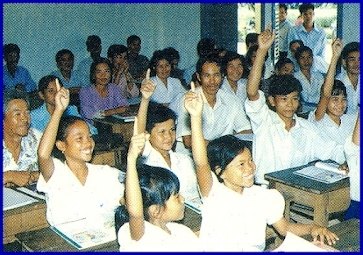 |
| The first Human Rights teaching class |
The project was organised around cluster schools with
the training in a main school central to the others. As I’d managed to help raise the funds for the
training I wanted to see it in action. I observed patiently the four days of
classroom teaching but looked forward most to the fifth day when the trained
teachers would put their new skills and knowledge in to practice. (It was a bit teacher-centred as was and tends still to be the way in Cambodia although we did work later to make it more
learner-centred.)
The fifth and final day arrived. A model class
in the morning was followed by a closing ceremony presided over by an Education
minister and Ambassadors of the countries that generously donated the money. It
included generous per diems to top up the very meagre official pay of the
teachers, so we always had enthusiastic participation. All of this was going on with the buzz of pupils milling around outside
spared from their usual in-class lessons for the occasion.
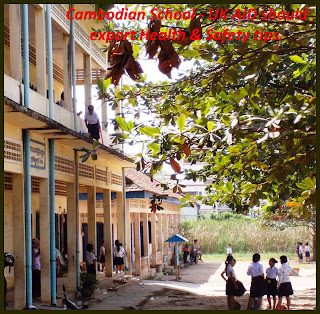 |
| Cambodia Junior High School Safety Risk? |
“This morning’s demonstration class was fine but what I don’t understand
is why our newly-trained teachers are practising their new skills on fellow
teachers, not on real pupils who are here and playing out there!”
This was not to be the first or last time I
questioned conventional thought in Cambodia where sticking to convention was
and remains very much the norm. However
in fairness to my colleagues and the officials they did indeed eventually agree
with my logic. So the children in my iconic image were the first actual real ones in a human rights teaching class. I can’t help remarking that they grasped the
concepts quicker than some of their teachers!
Despite it those pupils will remember their
school days as well as their far more illustrious peers in Stover, Millfield,
or Sherborne.
And yet despite being more illustrious,
children are children everywhere, especially as they approach adulthood and taste freedoms for the first time. Phil Gater
had set up his disco equipment at Stover School ready for the evening
frivolities, with many girls making light work of humping the heavy equipment. We never saw a teacher. Sixth-formers were in
charge. At first the music played but
the room was largely empty. Excited giggly girls stayed outside. We soon
learned why. Buses arrived with boys
from Millfield School, an organised social exchange. The boys and
girls all came streaming in to dance but Lo and Behold it wasn’t long before
the room emptied again. Almost all had quickly paired-off and
disappeared in to Stover’s ample grounds. Ah well you can’t win them all!
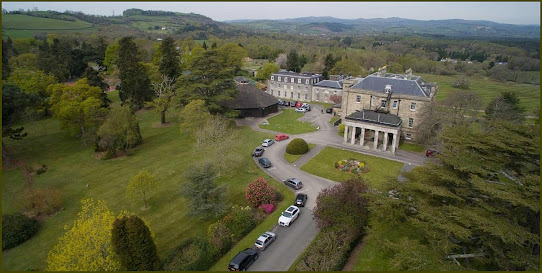 |
| Stover School’s ample grounds |
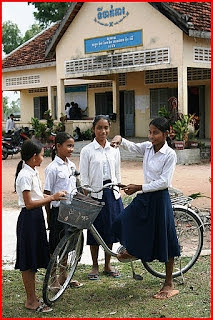 |
| Sponsored pupils |
Today reports of abuse of pupils are emerging
from all kinds of establishments from elite schools and seminaries, to humble
Buddhist Pagodas, and not just in UK but Australia,
Canada
and all around the world.
Sadly similarly even Saint Helena made international
headlines with one
set of allegations of child abuse.
And that is my connecting thread of this story, as per my
blog heading of linking a Northumberland life and times with the developing world.
Children from all walks-of-life can be abused. Adults entrusted with their care can and do abuse that trust. Just as every child remembers his or her school, such abuse marks them for life, in no matter which part of the world in which they live.
We
have much to do to eradicate abuse of children in all places entrusted to protect, care and nurture them.
.........ooo000ooo........
Jarai ethnic minority girls all sponsored to attend school and stay safely in a supervised hostel in Ratanakkiri Province, Cambodia.
One of the best ways to give Foreign Aid with maximum impact is through a sponsoring a child in a developing country to be able to attend school, to complete schooling, and ideally to go on to higher education.
This is especially important for girls not only to redress inequality with boys but also because it makes them literate numerate mothers and better parents.
It is also important for indigenous ethnic minority students where it helps entire communities to make best choices in how to integrate modernity with tradition.
And it is important for families living with disability. Indeed it can make the difference whether a disabled child can attend school at all or as in the case pictured above right of a very grateful girl with her two friends. She was the sole carer of her severely disabled mother. The bicycle US$ 30 enabled her to access school from home.
Sponsorship can be arranged quickly and easily. For UK sponsors I would recommend Plan International.
Finally as I have expounded much I do advocate for formal child self-protection groups and networks everywhere as the best means to deter and identify abuse. The UK relies too much on its top-down expert and adult-led safeguarding approach. It should learn from countries like Cambodia.
Updates and Comments (latest first)
27 September 2022
First comment and thread on Twitter - and a good point as to how ICT social media skills are well-used by perpetrators of child abuse but not yet fully-developed and widely-shared for protection:
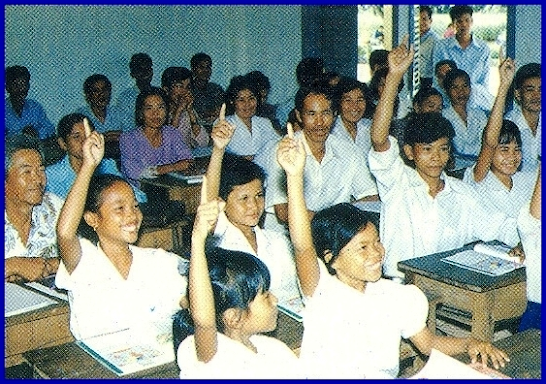



Great post. https://www.learningenglish-cambodia.com/
ReplyDelete